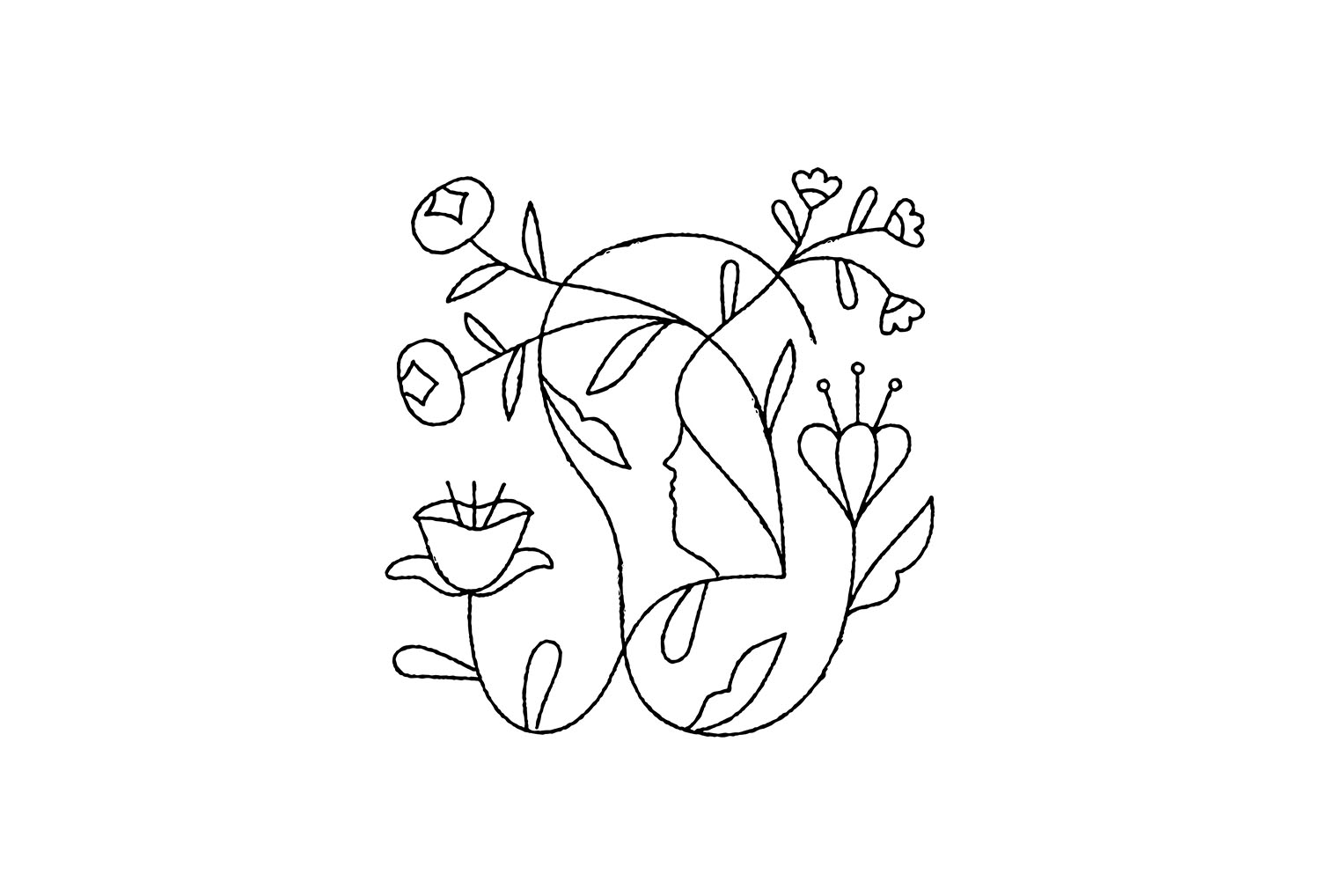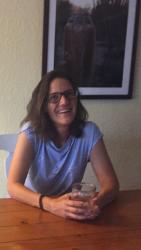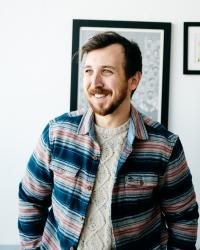On a plane ride home, I struck up a conversation with the man seated beside me. Among other things, I learned how my seatmate ran his own business refurbishing and selling trailers; that he had conducted a solo hike of the Pacific Crest Trail; that he was deployed twice to Afghanistan. I learned that he disliked the military; that he had been directionless when he signed up and didn’t know what else to do; and that he now believed it was a mistake to have joined, though it taught him many useful things.
Seated on my left, my hearing side, he told me a story: During training, a bomb detonated, exploding in front of him and another man. My seatmate ran a finger along a scar, two lines that made a ninety-degree angle on his cheekbone, as if someone had pressed a framing square through his skin. Along with a head injury that affected his cognitive function, he had shrapnel in one eye, hundreds of pieces that required he undergo multiple surgeries. His gaze was both discomfiting and magnetic, his eyes green and iron-flecked, as if the irises had absorbed the pigment of the metal surgeons worked painstakingly to remove.
My seatmate described how, after surgery, he had to go through lengthy rehab. At first, he couldn’t remember anything, couldn’t see clearly in that damaged eye. Still, he remained enlisted. He had made a commitment and he was sticking to it. He rejected the possibility of lost eyesight and reduced cognitive function, accepting only one outcome: He would heal.
Every day, he strained to see and remember better. As he said this his body pressed forward, his face tensing in the recollecting, his eyes growing even wider than they already were. Falling back into his seat, he grinned and slapped his knee.
Didn’t you know—it worked! His memory was now fully intact; his eyesight perfect.
“And the other man?”
My seatmate sighed. The other soldier had some burning, damage in one eye. Minor injuries, all things considered. But he complained a lot, said things were only getting worse. My seatmate tapped his temple. “It’s all up here.”
As the flight descended, the pressure in the cabin got to be too much. My ears began to ache, and filled up so I had difficulty hearing in not just one but both ears. Ever since childhood, this has happened to me on flights, and I never aged out of it. No amount of chewing gum, earplugs, or antihistamines helped, but over time I learned how to live with the pain. Living with sudden hearing loss in my right ear was something I’d only begun to learn.
Once we were on the tarmac, my ears popped. I felt sound restored. Had our descent fixed my ailment? But when I stepped out of the pressurized cabin, I realized hearing had only been an illusion.
As I waited for the shuttle, I wondered what my seatmate might have said had I told him about my condition. Would he have said I wasn’t trying hard enough? Was it as simple as a lack of willpower on my part, an issue only of attitude?
A month before that flight, on the day I was diagnosed with permanent nerve damage to my inner ear, the audiologist couldn’t hide her look of surprise. “We don’t normally get youngsters like you here,” she joked. (In the waiting room, I’d scanned the other patients, most of whom were retirees.) As she reviewed my test results, her lighthearted manner shifted to something more somber. When my eyes welled up with tears, her expression mirrored my own. Reflexively, I smiled, tamping my emotion, and made a joke about hearing loss saving me from a neighbor’s incessant complaints. I did this for her comfort.
I have been called a naysayer, a skeptic, a party pooper, a fatalist, a pessimist. Outside of skeptic, I don’t think I’m any of these things. Still, doubt creeps in sometimes. Should I have simply told myself, as my flying companion had, that I refused my new condition? Was I responsible for my own undoing?
When I shared my news with a friend, she wrote back that her father-in-law had gotten his hearing back after a year. Another friend insisted I get my thyroid checked; she’d read about the link between hearing loss and thyroid problems. People wanted to know how much I was sleeping, what I’d been eating, if I’d been drinking alcohol, smoking. I got advice about diets and supplements and exercise to increase blood flow to the ear. Yoga. Lots of folks told me to do yoga.
Many told me how annoying hearing loss in others was, as if it were a personality quirk intended to irritate and inconvenience them. They were frustrated that friends or family didn’t spend more money on aids, not comprehending that these devices do not solve the problem but accommodate it, and cost thousands of dollars rarely covered by insurance. Hearing loss was an invisible disability; there were no guide dogs or wheelchairs to signal impairment. The target of stand-up jokes and sitcoms, it was the hearing impaired who needed to accommodate the world, not the other way around. I was not immune to this insensitivity: Prior to my own diagnosis I often grew impatient whenever my father asked me to repeat myself.
When I went in for a second hearing test, my new audiologist asked me which was my good ear, stuffed it up with cotton, and then began to chatter away at me.
“I cannot hear you,” I said.
“Oh, right,” she said, laughing, removing the gauze. “Don’t worry. It wasn’t important.”
I eventually stopped telling people about my hearing loss, doing so only in situations where it might pose a problem, or when my inability to understand might be misunderstood as insensitivity—or worse, dimwittedness.
My father, who has suffered from hearing loss for years, put it most succinctly: “It makes me feel stupid.” When he was hospitalized for COVID-19, each time we called, my mother and I had to remind the medical staff that he wore hearing aids.
I wondered if his eight-week stay might’ve been reduced to six or even four had they simply made sure his hearing aids were fully charged and on when they spoke with him.
I, too, felt stupid, and was made to feel even stupider by people’s reactions to my news. In all those questions and inquiries, the dismissive comment (my father-in-law’s hearing came back), I had vague intimations that I was the problem, that the hearing loss had happened because of me. It was an echo of something from childhood: You’re not trying hard enough.
After a bit of research, I got a second opinion. Unlike my first ENT, this doctor ran his fingers along my neck and looked into both ears and up my nose. He took my pulse, holding my wrist as if it were the finest porcelain. He riddled me with questions, pausing to listen to my answers, gesturing to the medical records technician who’d rolled her computer into the examination room with us. Did you get that detail? he’d say. Patient says she had a head cold. No head trauma. Did you get that? He moved briskly, his unbuttoned lab coat fluttering behind him like a cape.
On the back of the examination-room door was a diagram of the inner ear. With it, he explained to me what he believed was the problem. I’d had a viral flare-up, likely when a head cold had compromised my immune system, and the virus had attacked the inner ear, affecting the endolymphatic sac. He paused, running his pen tip over what looked like a deflated birthday balloon. Altered saline levels of the fluid here had contributed to my hearing loss—what he diagnosed as Ménière’s. He prescribed a low-dose steroid along with other pharmaceuticals. He told me to cut back on salt.
I gathered up the prescriptions and hurried home to swallow pills. I clung to this certainty even as I got on my computer, looked up Ménière’s disease, and discovered how little its symptoms sounded anything like my own; even as I read the discouraging hearing-recovery rates; even as the pills did nothing. Making dinner, I left out the salt, trying to convince myself that with this one little shift all would return to normal.
Around this time, a twenty-year-old from Port Richey, Florida, won a lottery worth $450 million. His Facebook feed was riddled with quotes about positive thinking. When he was interviewed, he said he had a feeling he’d win. “This just proves that good things happen to people who think positively,” he said.
Throughout this time of specialists and tests and numerous checkups and check-ins and updates, I spent a lot of time in waiting rooms. There I perused magazines or was subjected to daytime television talk shows that extolled living my best life now or recounted the stories of everyday Americans whose personal narratives proved the power of prayer really worked. Colleagues recommended books like Positive Mindset or The Power of Positive Thinking.
Meanwhile, I began to lose interest in things I loved, and did the opposite of all the recommended advice: I ceased listening for birdsong and playing guitar. I preferred silence, the only state in which I was not reminded of my diminishment. I desired less and less to be out in the world. Like my father, I avoided crowds, certain restaurants. I became anxious when walking the dog or jogging because I was unable to hear the cars that came up behind me. The things I was supposed to do to make myself feel better had the opposite effect. People sometimes shook their heads. Think positive, they said. You need to think positive. Between the lines of these words I heard their truest message: Patient, heal thyself.
The last time I saw my ENT, he appeared distracted and sullen, more like an adolescent boy than a man. The technician was absent; it was just the two of us. He had difficulty holding my gaze. He said the next step was to get a hearing aid. “There’s no need to come all the way here for that,” he added. “Just find a licensed audiologist closer to home.”
I wrote to a close friend, a health professional, to get her advice. I was not yet prepared to accept that my hearing loss was, indeed, permanent. She wrote this: If it were me, I would ask what in my life and work am I unwilling or struggling to hear/listen to right now. Why am I being given this opportunity to have less auditory access to the outer world/is there something internally I need to attend to?
The questions struck a soft and tender bone of truth. For a while I’d been making decisions that seemed to be in stark contrast to what I actually wanted out of life. I was working a paid gig for long, demanding hours, and there was little time for me to enjoy my life. I’d become preoccupied with the opinions of others, valuing their perspectives over my own intuition. I’d ceased listening to my own gut.
Over the phone, I told my brother about my hearing loss. The two of us did not often talk. We lived on opposite coasts and hardly saw each other. I sometimes felt shy and awkward with him, prone to saying what I sensed were the wrong things. But some barrier between us lifted that day.
His voice cracked. “What do you mean?” He sighed into the receiver, and for a moment I had an image of his face and his eyes, like mine, quick to tears. “That’s awful.”
How did it happen? he asked. When? What did the doctors say? How bad was the loss? As we talked I realized he was the first person who took the time to ask me questions about my ailment.
“I’m sorry,” he said. “That sucks.” He kept saying it over and over again. “That sucks. That fucking sucks.”
Thank you, I thought. Thank you. Thank you. Thank you.
Not long after that, theaudiologist handed me brochures about different models of hearing aids. “None of them will ever be as good as natural hearing,” she explained, “but some are better than others.”
As she spoke she brushed back her hair. It was wavy, strewn through with red. Delicate gold hoops dangled from her freckled lobes. “I have a set of these,” she said, tapping the back of her ear with the tip of an index finger.
At first, the gesture did not register. Then I saw: hearing aids. That’s how I knew I was in good hands.
With hearing aids, familiar voices were rendered foreign. The technology was rigidly democratic. I simultaneously heard the wind, the refrigerator, and my spouse’s concerns all in equal volume and importance.
That said, I began to play guitar again, to seek out birdsong. I discovered one benefit to hearing loss: When our neighborhood exploded with the booming of fireworks late into the night on the Fourth of July, I lay on my good side and slept peacefully through it all.
I commiserated with my father, swapping notes. When I volunteered for the local science fair, I was assigned to be the docent of a group of children who’d come from a school for the deaf.
One afternoon at a community arts event, I sat beside a young woman who was a visual artist. We began to chat. When at one point I was unable to hear her, I said what I had grown accustomed to saying: “Could you repeat that? I’m hard of hearing.”
She grinned. “Me too.”
“No,” I said. “I mean—I’m really hard of hearing.”
“Yes,” she said, nodding enthusiastically. “Me too.”
The universe was presenting itself to me; I just needed to pay attention.
A year and a half later, my hearing returned. It was the start of hurricane season and any changes in my ear I attributed to shifts in barometric pressure, the weather. I began to think there was a problem with my aid. The last time I’d seen my audiologist, she’d made some updates to my hearing aid and I wondered if she hadn’t inadvertently altered the settings. When I watched TV certain sounds startled me, they were so loud. One evening, after dinner out with friends, I realized the battery in my aid was dead.
I took a trip to visit family. Another plane ride, but no conversation to make the time go by quickly. As usual, my eardrums popped during the flight. Walking from the terminal to the car rental, I thought it was the design of the airport that made things different. Low ceilings, narrow walkways, and carpeted terminals contained sound. It made sense that I’d hear better in such an environment. But then I was outside. And then I was in a car. Driving through the mountains, my ears filled and popped again. The radio played softly, but I could make out conversations, every lyric in a song.
From the living room in my sister’s house I could hear my father’s deep voice, the specificity of his words, coming from the kitchen. Reflexively, I reached for the back of my right ear, but my hearing aid wasn’t there.
I suppose I should be making some sort of meaning out of all of this, but then I come up with nothing other than notions of impermanence. In the same way that my hearing loss turned out to be impermanent, so, too, is the hearing that has been restored; I will inevitably lose it again. It could be in a year or in twenty. It could be while I am still healthy and living or seconds before my absolute conclusion. If there is anything out of my experiences that I have come to believe, it is this.
Sometimes I wonder about the boy who won the lottery ticket. “Such good news!” says the world. Statistically, however, he is fated to regret his good fortune; most lottery winners do. But that is not for me to know or judge or presume. For my part, I regret nothing. For now, I just work hard at listening.









